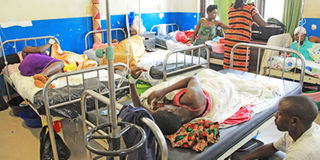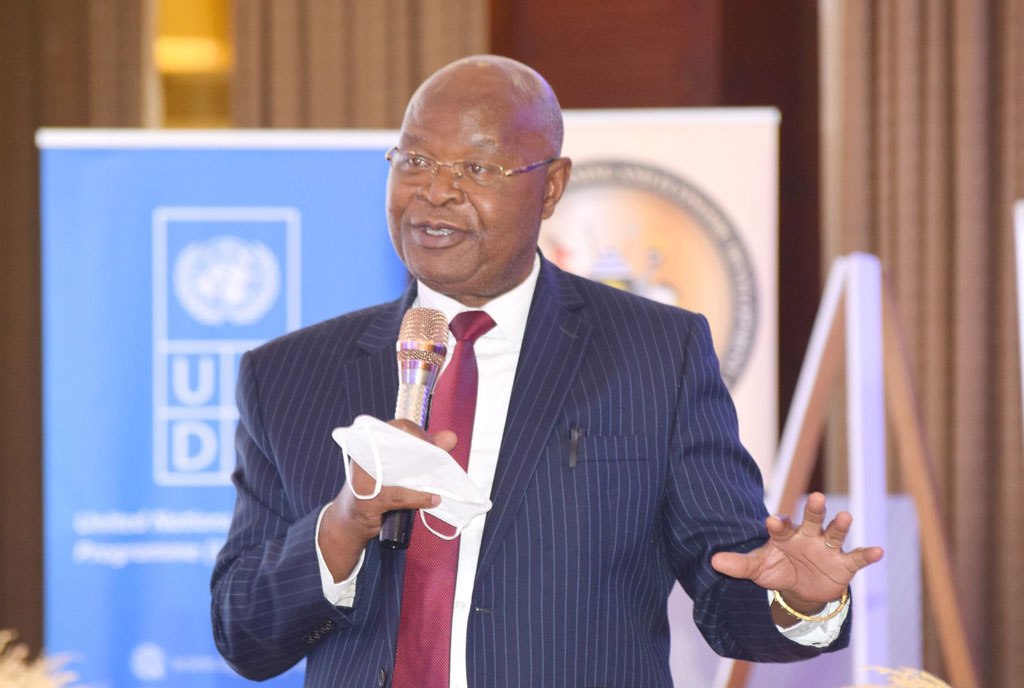Patients turned away as Covid-19 burden grows

Overwhelmed. A maternity ward in Naguru hospital last year. The hospital is currently congested and has reportedly been turning away patients amid the pandemic. Photo by Rachel Mabala
What you need to know:
- A total of 1,001 are under follow up, 812 of these are under institutional quarantine and 189 under self-quarantine.
Nalwanga Mayi, 23, who delivered through caesarean section at Naguru hospital, said she was turned away from the facility on Friday when she had gone for review.
She said health workers told her there were no nurses to attend to patients.
As she started trekking back home in Kireka with her six-month-old baby and helper, she was joined by 19-year-old Justine Nandaula, who was struggling to walk to Mbuya, a city suburb, about 3km away.
Nandaula delivered on Friday at 2am in the same hospital through a C-section but was discharged before the stiches in her wound were due for removal.
A helper assisted her to carry the baby as she lifted her personal effects. She could not take a boda boda because public transport has been suspended and neither could she afford a cab.
These are not isolated cases. Health workers in various hospitals are turning away patients as coronavirus pandemic stretches the health facilities.
Uganda has already confirmed 30 cases and the situation seems to be getting worse.
At Kawempe Hospital, an inside source, who spoke on condition of anonymity, said the medics have refused to treat patients for fear of getting infected by coronavirus.
“Yesterday, they were sending patients away from the gate. Those patients who were already admitted were not attended to. The behaviour is from top to bottom. They all report at work but they do nothing. It is so annoying,” the source said.
The source added that while only two doctors are working at the hospital, other health workers are extorting money from mothers trapped inside.
At the gate and other places, cleaners, security guards and other staff have joined the extortion scheme.
“What is disheartening is that after these two committed doctors have treated or operated on the mothers, even without the assistance of these midwives, these midwives ask these patients to pay them money claiming the doctors who worked on them want it,” the source told Daily Monitor.
When we visited the hospital, it was largely deserted. The waiting lobby for pregnant women had about three to five.
One of the women, who did not want to be named said, she was informed most of the services such as antenatal visits and immunisation were suspended on Monday.
However, she said one of the health workers asked for Shs20,000 through cleaners to examine the mothers who had turned up.
When we approached one of the cleaners only identified as Edith, she said she would take us to the doctor if we paid at least Shs20,000.
“The antenatal services were stopped on Monday but there are some doctors who can help you but you will have to give them something and I connect you to them. I will give you a phone number, when you come tomorrow I will take you to the doctor if you want,” she said.
Ministry responds
Dr Nehemiah Katusiime, the executive director of Kawempe Hospital, said they had not stopped any services but are looking at the modalities of how to decongest the hospital.
“No patient was sent home. We are still grappling to see how we can decongest the hospital but we are not abolishing services. We are still looking at modalities of how we can decongest, but nothing concrete yet has been decided upon. We are waiting for more guidance from the ministry,” Dr Katusiime said.
Dr Diana Atwine, the permanent secretary of Ministry of Health, said hospitals should find a way of decongesting their premises but still offer services to everyone.
“The surgeons involved in caring for coronavirus patients are operating from upper Mulago. The hospital is completely separate from lower Mulago. If they say they are not using the lower theatres, I would understand because that is where we are keeping the sick,” Dr Atwine said.
Entebbe hospital for Covid-19 cases
“When someone comes for operation, he or she should be operated, the way to decongest the hospital is limiting the attendants but there is a way we can continue giving services; give appointments, let patients call before they come to make it possible to provide services,” she added.
In a related event, government has declared Entebbe General Hospital to only admit Covid-19 patients and has directed the others to go to other health facilities. Dr Moses Muwanga, the hospital director, said following the increase of coronavirus patients, the hospital is not safe for others.
“We have other coronavirus patients, so we cannot combine normal patients with those ones. It is an isolation centre,” Dr Muwanga said.
He added that part of the hospital will be for suspected cases and the other for confirmed cases.
“We shall put one area for suspects and another for confirmed. Can you accept to come for treatment in such a hospital? But we are advising them to go to other facilities, the hospital is not very safe,” Dr Muwanga said.
In a recent interview with this newspaper, Mr David Nuwamanya, the principal administrator of Mulago Referral Hospital, said minor ailments and some surgeries had been suspended to decongest the hospital.
Currently, the hospital can only attend to life threatening cases and emergencies to avoid many patients.
“We are not turning them away but we have informed those with elective cases, who can wait, to extend their appointments,” Mr Nuwamanya said yesterday.
He added: “There are many ear, nose and throat (ENT) cases that are due for surgery. Other surgeries like cataract can wait for some time, it is not life threatening but it is just uncomfortable.”
As the number of people infected with coronavirus in the country keeps growing, government is concerned about the capacity of the healthcare system to handle the enormity of the problem and has urged people to adhere to preventive measures to stop further spread.
The number of coronavirus patients in the country hit 30 yesterday, up from 14 announced on Thursday.
Addressing the nation on Friday, Dr Henry Mwebesa, the Ministry of Health director general of Health Services, said everyone must be involved to keep the numbers low before they can escalate to unmanageable levels.
“In this country, we cannot afford, like in South Africa where they have risen to 700 and in Europe. We must use preventive measures to keep the numbers as low as possible,” Dr Mwebesa said.
When this newspaper visited Mulago on Friday, despite government efforts to control the spread of the virus, there are still serious gaps.
For instance, many people who had turned up for coronavirus screening were in despair after they were asked to come back the following day.
One of the people who did not want to be named said this wasn’t the first time she was being asked to come back.
“I was here on Thursday but they told me and my friend to come back the following day. We have been seated here since morning but nothing has been done,” she said.
A one Mugisha who had travelled to Dubai said he reported to the new Specialised Mulago Hospital where they had asked the travellers to go but he was surprised after reaching there to be put under quarantine without taking samples from him as the ministry had told him.
Mr Mugisha said he has not yet been tested.
Dr Atwine acknowledged that she had received information on how people were being turned away.
“That is why we encourage to first call and also be given appointment. Our people are not used to that. I have been told some people have been sent back to come back on another day. They don’t want to encourage crowding because also this testing takes some time,” she said.
Cases in country
In a statement yesterday, the Ministry of Health confirmed seven new Covid-19 cases bringing the total number to 30. The seven cases were all imported, of which four were under institutional quarantine and three under self-quarantine.
A total of 1,001 are under follow up, 812 of these are under institutional quarantine and 189 under self-quarantine. A total of 1,660 high risk travellers have completed the 14-day quarantine while 497 contacts of confirmed cases are under follow up.



